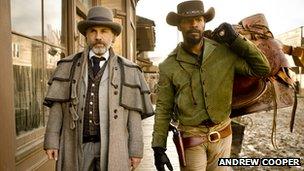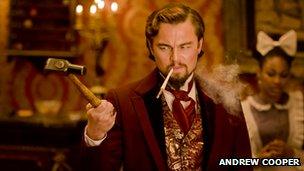Tarantino's Django in firing line
- Published
Boasting five Oscar nominations, and having already won best screenplay at the Golden Globes, Quentin Tarantino is basking in the attention of the Hollywood establishment.
His latest offering, Django Unchained, follows the fate of a slave in the deep South - played by Jamie Foxx - two years before the American civil war breaks out.
Named Django, he ends up joining forces with German bounty hunter Dr King Schultz (Christoph Waltz) as he seeks to wreak vengeance on the slave owners who have mistreated his wife (Kerry Washington).
It's 20 years since Tarantino's directorial debut, Reservoir Dogs, burst on to the big screen. So does he now feel part of the establishment?
"I don't feel like an outsider at all… I was an independent film-maker when I came out with Reservoir Dogs.
"I had that kind of outsider's energy, in so far as being very, very new to this business.
"But they didn't treat me like an outsider. I was embraced.
"They were really applauding my success. Since then, I actually think I'm a good upstanding member of the Hollywood community!"
Django Unchained is an epic adventure that cuts across many genres - spaghetti western and historical drama, to name but two. And its ambitious scale was something that Austrian actor Waltz could not resist.

Dr Schultz frees Django and takes him on as his apprentice
"Quentin loves genre movies, I think he's seen every movie ever made," Waltz says, "and he remembers everything".
"He can play on genres like other people play an organ. He pulls the registers, he finds these themes and phrases, he can cross-reference everything. It's extraordinary."
Waltz won a best supporting actor Oscar in 2010 for his role in Tarantino's last film, Inglourious Basterds. And he is up for the same award this year, for his portrayal of the enigmatic and charismatic dentist Dr Schultz.
Waltz says his second Oscar nomination feels "good".
"It's different this time because it was so out of my scope the first time. Now, it's a little more relaxed.
"I've played a lot of roles for a lot of years without getting any recognition and then once in a while I did get recognition.
"In a way it changed everything, once I was propelled into this new way of doing it, (working) with Quentin.
Tarantino is equally effusive about Waltz, saying he inspired the character of Dr Schultz.
"The way he does my dialogue, he sings it, he turns it into poetry," the director says.
"I didn't consciously set out to write King Schultz. If I had never met Christoph before I doubt there would even be a King Schultz. He just almost escaped from the pen."
But Waltz, who joined the project before the script was finished, is surprised to hear of the influence he exerted.
"I'd be an idiot to interfere with Quentin as he's writing a story," he smiles, "but it was fabulously exciting to see this story unfold as he was writing it".
It seems Waltz is not the only actor to relish working with Tarantino.
Foxx says: "I hope every actor gets a chance to be in the Quentin Tarantino school. Look how iconic it is, all the way down to the posters.
"I keep looking over and thinking 'Is that really us?' It's amazing."

Leonardo di Caprio has never played an out-and-out villain before
But while there may be a love-in amongst the cast and crew, some outside the movie are casting a critical eye over the film's violence, The story involves countless shootings, a vicious fight scene and furious abuse against slaves.
Tarantino himself may be tired of discussing it - just ask Channel 4's Krishnan Guru-Murthy, who got a stern dressing down during an interview last week, external - but Waltz defends the guts and gore.
"I would have an issue with the violence were it gratuitous. But how would you tell a story about slavery without showing the violence? It's impossible, it was based on violence and violation.
"If you don't want to show violence and violation, don't make a movie about slavery."
The film has garnered largely positive reviews ahead of its UK release although there has been a mixed response from prominent African American film-makers.
Spike Lee tweeted, with pointed use of capitals: "American Slavery Was Not A Sergio Leone Spaghetti Western. It Was A Holocaust. My Ancestors Are Slaves. Stolen From Africa. I Will Honour Them."
Kerry Washington, who plays Broomhilda, Django's wife, says she felt a responsibility to the black American audience.
"We were very concerned and proud of the response from the African-American community in the US because in some ways the film belongs to that community.
'A gargoyle'
"Fundamentally, it's a hero's journey and a love story and we all wish someone loved us the way Django loves Broomhilda."
She acknowledges that playing a slave was a mental strain. One that Foxx helped her through.
"We were able to support each other. There's a mutual admiration and respect, we love each other. So to get through some of the tough emotional psychological stuff in the film… I will forever be indebted to this man."
Leonardo DiCaprio and Samuel L Jackson play two of the film's big villains, plantation owner Calvin Candie and his right-hand man, Stephen, who keeps the slaves in line.
While Jackson is a Tarantino regular, it was DiCaprio's first time working with the award-winning director.
"He'd never played a villain before," says Tarantino, "and we made a conscious decision that we would never use the V word.
"He wasn't a villain, he was a character. A gargoyle, as far as I'm concerned."
Despite the awards buzz, Tarantino is not putting any bets on his film winning an Oscar.
"I don't think we're going to win best film but... being invited to the party is a lot of fun."
Django Unchained is released in the UK on Friday 18 January.
- Published20 December 2012
- Published10 January 2013
- Published7 January 2013
- Published18 December 2012